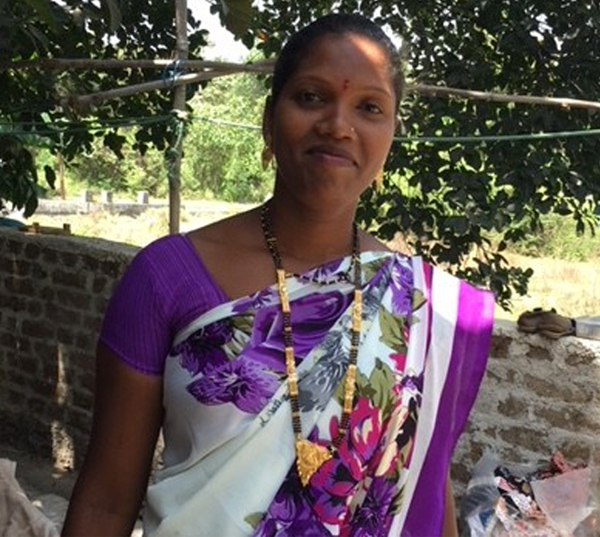A Day in the Life of Darshana Hemade
June 01, 2018
Embroidery artisan at Ranphul Mahila Mandal
Darshana lives in Dahisar with her husband Denesh, a rickshaw driver, their daughter Mansee (13 years old) and son Kritesh (10). She gets up by 5 a.m. every morning because she has a lot of jobs to fit into the day.

As soon a she has cleaned the house and dishes, she heads out to pick flowers in the commercial fields. She and a few other women pick about 3 - 4 kilos of mogra (Arabian jasmine) every day. At 8 a.m., she delivers her flowers to the vendor.
The price paid can vary from 50 rupees per kilo to a high of 300 during festivals and the wedding season. During the Ganesh festival, she can get 500 rupees for 100 flowers. The work varies with the season: April through June have the most flowers in bloom, though there are some all-season flowers like jaswand (hibiscus).

From flower picking she goes to help her father-in-law with his dairy business. Twice a day he milks the cows and she packs the milk into bags which will be distributed to customers. During the morning milking session, she also gets her children ready for school and puts them in a rickshaw to go to their English medium school.

Next on Darshana's schedule is a stint as a teacher at the anganwadi, a child care center for children 3 to 6 years old. At 1:00 p.m., she usually gets home for lunch. Cooking meals has to be fitted in whenever there's time; sometimes she cooks before going to the anganwadi, sometimes afterwards. On some days, she goes to her mother's farm from 4:00 to 6:00 to help pick vegetables.
She also does her embroidery work in the afternoon. Like many of the other artisans in her group, she enjoys staying at the workshop to do her work, for the sake of both efficiency and companionship. Depending on how much work she has, she may be there until 6:00 or 7:00 p.m. When she goes home she cleans, packs the second batch of milk, and prepares dinner. The family eats around 10 p.m., and Darshana is ready for bed at 11:00 p.m.

All of this traveling between activities is made possible because Darshana has her own scooter. There is little public transportation in her semi-rural community, so it is not unusual for women in the area to learn to ride scooters. For Darshana it is not only a necessity, but a pleasure to ride her scooter. Her husband, brother and father are also eager to borrow it.

This year her regular routine was changed a bit because they celebrated her brother's wedding. About 500 people attended. It is the tradition to divide the festivities into two parties, one party for females and one for males. Her parents paid for the males' function. She really enjoyed dancing and all of the food. Normally she and her family eat simple vegetarian food, but occasionally buy panipuri (a savory snack with a crisp shell, vegetables and flavorings) from a roadside stand. On Sundays they relax by going to the beach or the park for part of the day.

